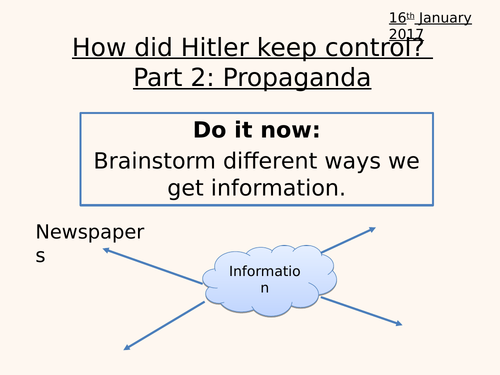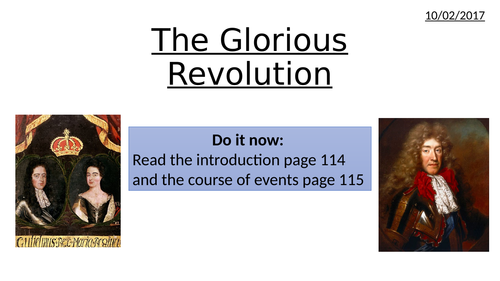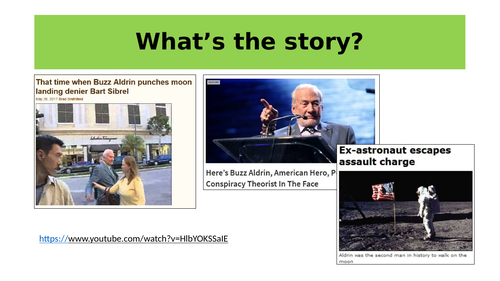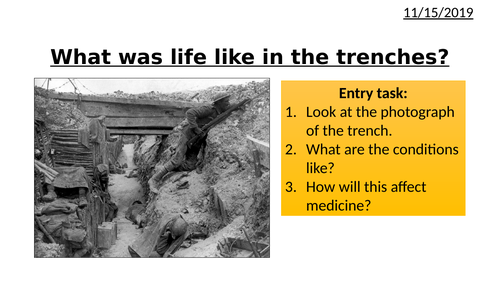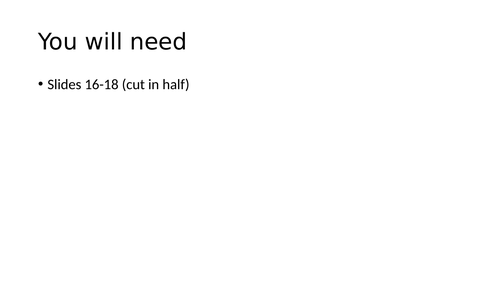338Uploads
116k+Views
41k+Downloads
History

Holocaust: Warsaw Ghetto
For teaching 11-14s Holocaust
This lesson looks at 'What was life like in the Warsaw Ghetto?'
Students will start by looking at what is a ghetto and their locations across occupied Europe. This also includes a timeline of how the ghettos came to be.
Students will then look in depth at the Warsaw Ghetto by watching a series of videos by Yad Visham on YouTube. They will also look at a letter written from Warsaw Ghetto and complete one of three differentiated tasks!
Finally students will write their own letter from the Warsaw Ghetto describing what life was like.
This lesson is differentiated for all students in your class, and includes all resources needed. Minimal resources needed - perfect for even setting as cover!
Feedback is welcome, and please check out my other Holocaust lessons and materials.

Modern Prisons HOME LEARNING
This is a home learning lesson for teaching life in Modern Prisons - suitable for KS2 or KS3.
This lesson comes with an answer sheet!
This lesson includes a variety of tasks and activities which can be completed by a student. This was designed to be completed independently and all information and resources needed are included in the lesson!
This is perfect for parents who can print this off and give to their child, or for teachers to set online as students can fill in the pages. Includes a word document for editing, or a PDF version to be printed straight away!
Please review if you purchase, feedback is welcome.

How well did King John rule?
Suitable for 11-14s - could be adapted for KS2
Whole lesson, plus resources, on 'How Well did King John rule?' Student's look at the decisions King John made and judge overall if he was a good medieval king.
Includes a range of differentiated activities and tasks suitable for all abilities.
Please check out my other King John lessons and resources; feedback is welcome.

Did Charles I deserve to be executed?
Suitable for 11-14s. Whole lesson plus differentiated resources asking did Charles I deserve to be executed? Students look at a range of evidence to come to a judgement. Also look at the consequences and aftermath of his death.

Nazi Propaganda
Whole lesson plus differentiated resources for a lesson on Nazi Propaganda, suitable for 14-16s. Looks at the role of Goebells, and includes a worksheet on annotating Nazi propaganda posters.

The Glorious Revolution
Suitable for 16-18s, A/ AS level lesson on the Glorious Revolution - used more as a summary lesson for Year 13s. Includes a BBC article and useful video plus video quiz. All resources included.

Did man land on the Moon? STEM Lesson
Whole lesson plus resources for teaching ‘did man land on the Moon?’
This was created as part of STEM week, ** this can be used as a stand alone lesson in Primary, or KS3 History or Science!**
Students use information sheets (provided) to decide for themselves in man landed on the moon. They use this to complete a table analysing the evidence. Students also complete differentiated activities, including a higher level thinking question of ‘do we live in a post truth age?’
A fantastic lesson that really gets students thinking and debating!
Please review if you purchase.

GCSE WW1 Medicine Exam Skills Guide
For teaching Edexcel 9-1 GCSE Medicine Through Time - WW1 Historic Environment
This is an exam skills guide to be given to students which breaks down all 3 questions with a comprehensive guide on how to answer each question. Includes exam questions and model answers.
This was written as an exam marker for Medicine Through Time!
Students have given feedback that they find this guide extremely useful and bring it to every lesson to support their exam questions!
Please review if you purchase, and check out my other WW1 resources.

Why did Henry VIII create the Church of England?
Whole lesson plus all resources needed for teaching 11-14s Why did Henry VIII create the Church of England?
This lesson looks at the reasons why Henry VIII created the Church of England;
Divorce
Money
Reform the church
This is done using a variety of differentiated tasks, including videos, sorting out fact cards and putting statements in the correct chronological order.
Finally, students will decide on the most important reason Henry VIII created the Church of England.
Please review if you purchase and check out my other Tudor resources.

What was the Black Death?
Suitable for teaching KS3.
What was the Black Death? An enquiry lesson that looks at the skeletons recently discovered at Charterhouse Square. Students need to investigate what killed 50% of the population in 1348. Even includes news clips from when the skeletons were discovered!!
Whole lesson including differentiated activities and resources.
It is useful to have the textbook Making Sense of History textbook 1066-1509
however the lesson can be adapted for use without out as it is only needed for one task.

Democracy and Dictatorship
Suitable for teaching 11-16s.
This lesson looks at the difference between democracy and dictatorship and can be used as a starter lesson for introducing Nazi Germany or the Cold War.
The lesson includes activities such as sorting political parties on a spectrum and understanding countries that are a democracy/dictatorship today.
Please review if you buy and check out my other resources.

WW1 Propaganda
Suitable for teaching 11-14 on reasons why people signed up for WW1 - Why did people to go war?
The whole lesson plus resources looks at why people signed up for WW1 using propaganda. The students will analyse examples of WW1 propaganda, understanding how this persuaded young men to join the war effort.
If you purchase, please review and check out my other WW1 lessons.

Battle of Britain
For teaching 11-14s
Why did Britain win the Battle of Britain?
This lesson looks at why Britain won the Battle of Britain. Students begin by understanding the context after Dunkirk and Hitler’s plan (including 2 videos!), then looking at which side was better prepared.
Then students will use differentiated sources (included) to assess why Britain won the Battle of Britain.
Please note 20th Century World textbooks by SHP are needed for 1 task (the which side was better prepared) but the rest of the lesson is fully resourced!
Feedback is welcome; please review if you purchase!

Norman Conquest: Motte and Bailey Castles
Suitable for teaching 11-14s Norman Conquest (can be adapted for primary).
Whole lesson plus all differentiated resources needed on motte and bailey castles! Students will be answering the enquiry question:
Why did William the Conqueror build so many castles?
Students use Warwick Castle as a case study (fantastic if you go there on a trip), label a motte and bailey castle, look at how to attack and defend, and finally understand why William built so many castles around the country.
A really fun and interactive lesson which students love.
Please review if you purchase, and check out my other Norman Conquest resources.

GCSE: Introduction to WW1 Medicine
For teaching GCSE Edexcel 9-1 Medicine Through Time - British Sector on the Western Front
This whole lesson plus resources (as a booklet, but can be easily adapted to be worksheets for exercise books) is an introduction for WW1 Medicine. This lesson looks at;
What are trenches? How did we come to trench warfare?
Analysing two letter extracts from Richard Smethurst, with a focus on medical conditions that can be ascertained from them
Trench structure
A selection of WW1 videos for making a mind-map about life in the trenches, including The Somme, Gas, Barbed Wire and more.
The whole lesson has an underlying focus on medicine to encourage students to discuss and consider the medical conditions that may arise in the trenches.
Please review if you purchase, and check out my other WW1 Medicine lessons!

Schlieffen Plan
For teaching 11-14s WW1.
Whole lesson plus resources on the Schlieffen Plan. The lesson looks at what the German plan is (and gets students to come up with their own), and the failure of the Schlieffen Plan by analyising the source ‘Bravo, Belgium’. Students will then decide the most important reason for failure.
Please review if you purchase, and check out my other WW1 lessons!

What was life like in the trenches?
For teaching 11-14s WW1.
What was life like in the trenches? Whole lesson plus resources included. Students start with a key word-description match up, and also look at two letters by Richard Smethurst in the trenches, analysing them for key details.
The main part of the lesson gets students to make notes/mind-map on life in the trenches using carefully selected videos (mostly Dan Snow’s fantastic WW1 Uncut series) and then writing a trench letter.
Please review if you purchase, and take a look at my other WW1 lessons and resources.

Children in the factories
Whole lesson plus differentiated resources and activities for teaching: 'What were conditions like for children working in factories?'
Students begin by understanding why factories were built and an introduction to some of the conditions in factories.
Students then use differentiated sources about factory life to record:
Age of workers
Hours worked
Type of work
Injuries/accidents
Pay
Punishments
Students will finish by completing one of 3 differentiated activities including an exam style ‘describe two features’ question!
Please review if you purchase, and check out my other Industrial Revolution resources on my shop.

Industrial Revolution 1750-1900
How did life change between 1750 and 1900?
Whole lesson plus differentiated resources for teaching 11-14s ‘how did life change between 1750-1900?’
Students will start by looking at inventions and guessing whether they were created before or after 1750, and then look at the Industrial Revolution.
Students complete a table (differentiated) using the information sheet (PROVIDED!) about changes in;
Population
Work
Transport
Health and Medicine
Living Conditions
Finally, students complete one of 3 differentiated tasks summarising the changes between 1750-1900. Also includes a ‘quick quiz’ plenary!
Please review if you purchase, and check out my other industrial revolution resources!

Why did children support the Hitler Youth?
Whole lesson plus all worksheets and resources needed exploring why young people supported the Nazi’s. Differentiated activities suitable for all students in your class.
Suitable for 11-14s.
Please review if you purchase, and check out my other Hitler Youth lessons and resources!





